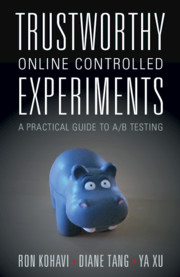Book contents
- Trustworthy Online Controlled Experiments
- Reviews
- Trustworthy Online Controlled Experiments
- Copyright page
- Contents
- Preface
- Acknowledgments
- Part I Introductory Topics for Everyone
- Part II Selected Topics for Everyone
- 5 Speed Matters
- 6 Organizational Metrics
- 7 Metrics for Experimentation and the Overall Evaluation Criterion
- 8 Institutional Memory and Meta-Analysis
- 9 Ethics in Controlled Experiments
- Part III Complementary and Alternative Techniques to Controlled Experiments
- Part IV Advanced Topics for Building an Experimentation Platform
- Part V Advanced Topics for Analyzing Experiments
- References
- Index
6 - Organizational Metrics
from Part II - Selected Topics for Everyone
Published online by Cambridge University Press: 13 March 2020
- Trustworthy Online Controlled Experiments
- Reviews
- Trustworthy Online Controlled Experiments
- Copyright page
- Contents
- Preface
- Acknowledgments
- Part I Introductory Topics for Everyone
- Part II Selected Topics for Everyone
- 5 Speed Matters
- 6 Organizational Metrics
- 7 Metrics for Experimentation and the Overall Evaluation Criterion
- 8 Institutional Memory and Meta-Analysis
- 9 Ethics in Controlled Experiments
- Part III Complementary and Alternative Techniques to Controlled Experiments
- Part IV Advanced Topics for Building an Experimentation Platform
- Part V Advanced Topics for Analyzing Experiments
- References
- Index
Summary
Why you care? Organizations that want to measure their progress and accountability need good metrics. For example, one popular way of running an organization is to use Objectives and Key Results (OKRs), where an Objective is a long-term goal, and the Key Results are shorter-term, measurable results that move towards the goal (Doerr 2018). When using the OKR system, good metrics are key to tracking progress towards those goals. Understanding the different types of organizational metrics, the important criteria that these metrics need to meet, how to create and evaluate these metrics, and the importance of iteration over time can help generate the insights needed to make data-informed decisions, regardless of whether you also run experiments.
- Type
- Chapter
- Information
- Trustworthy Online Controlled ExperimentsA Practical Guide to A/B Testing, pp. 90 - 101Publisher: Cambridge University PressPrint publication year: 2020

